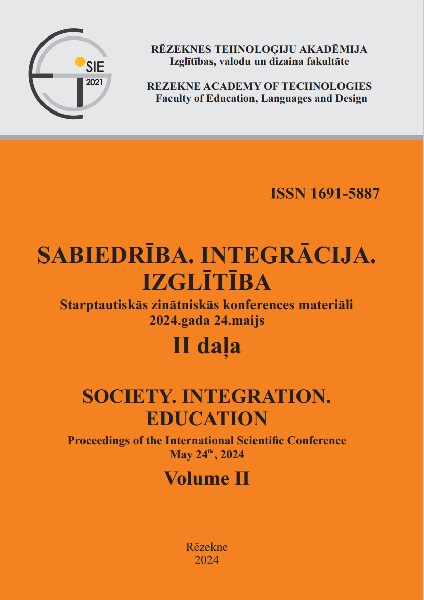IMPLEMENTATION OF INTEGRATED CYBER EDUCATION IN EUROPE
DOI:
https://doi.org/10.17770/sie2024vol2.7838Keywords:
cyber education, cyber threat counteraction, cybersecurity, digital skills, integrated cyber education systemAbstract
The development of partnerships between European countries in the field of cyber education is currently playing a significant role in enhancing countries’ cyber potential and comprehensive and systemic counteraction to cyber threats. The research aims to outline the main principles of implementing an integrated cyber education system in European countries. To solve the tasks set, the research uses the following methods: cognition methods to study theoretical foundations of digital education development; comparative and analytical methods to analyze National Cybersecurity Indices and Digital Development Level Indices of the EU and Ukraine; heuristic (expert) methods to formulate the goal, objectives, conclusions and recommendations to form a multilevel generalized model of cyber education; and logical and formalized methods to outline the relevance of cyber education to counter cyber threats.
The research discusses the issue of digital education, presents National Cybersecurity Indices and Digital Development Level Indices of countries, explores the gaps between National Cybersecurity Indices and Digital Development Level Indices of the EU and Ukraine, and outlines the basic principles of the European Cybersecurity Taxonomy. The main research results are the proposed categorical apparatus of integrated cyber education in European countries and the multi-level generalized model of cyber education to gradually acquire skills and abilities to combat cyber threats introduced from primary school to adult education.
Thus, a comprehensive acquisition of skills to combat cyber threats will help to develop knowledge, skills and abilities of European citizens in the field of cybersecurity and improve the cyber potential of European countries. The introduction of unified regulatory courses and methodological support developed in accordance with the best international practices and harmonized with the terminology of EU and NATO member states will enable effective cooperation in a single information and cyber space.
References
Arbidane, I., Purii, H., Mamanazarov, A., Hushko, S., Kulishov, V. (2021). Digital Transformation Modelling in the Context of Slowbalization. Intern. Sc. Congr. Society of Ambient Intelligence (ISC-SAI), Series: Information Technologies and Business Innovations, 100, 7. DOI: https://doi.org/10.1051/shsconf/202110001003.
Cybersecurity Education Initiatives in the EU Member States. (2022). European Union Agency for Cybersecurity. Retrieved from: https://www.enisa.europa.eu/publications/cybersecurity-education-initiatives-in-the-eu-member-states
Digital Education Action Plan (2021-2027). (2020). European Commission. Retrieved from: https://education.ec.europa.eu/focus-topics/digital-education/action-plan
Fovino, N. I., & Neisse, R. & Hernández-Ramos, J. & Polemi, N., & Ruzzante, Gian-Luigi & Figwer, M., & Lazari, A. (2019). A Proposal for a European Cybersecurity Taxonomy. European Commission. DOI: https://doi.org/10.2760/106002.
Lloyd’s – the world’s insurance marketplace. (2023). Lloyd`s Systemic Cyber Risk Scenario: Potential Global Economic Losses of 3,5 trn. Retrieved from: https://beinsure.com/lloyds-systemic-cyber-risk-scenario/
Tanriverdiyev, E. (2022). The State of the Cyber Environment and National Cybersecurity Strategy in Developed Countries. National Security Studies, 23, 19-26. DOI: https://doi.org/10.37055/sbn/149510.
The Cybersecurity Act (EU 881 / 2019). The Official Journal of the European Union. Strasbourg. Retrieved from: https://eur-lex.europa.eu/eli/reg/2019/881/oj
The Cybersecurity Strategy. (2023). European Commission. Retrieved from: https://digital-strategy.ec.europa.eu/en/policies/cybersecurity-strategy
The National Cyber Security Index Ranking [NCSI]. (2023). Е-Governance Academy Foundation Company. Retrieved from: https://ncsi.ega.ee/ncsi-index/?type=c
World Economic Forum. (2022). Which countries spend the most time on social media? Retrieved from: https://www.weforum.org/agenda/2022/04/social-media-internet-connectivity/






